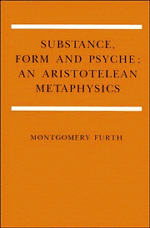I - CROSS- AND INTRA-CATEGORIAL PREDICATION IN THE CATEGORIES
Published online by Cambridge University Press: 04 August 2010
Summary
Categories: preliminary rationale
It was suggested in §0 that the metaphysical theory of the Categories could be seen as a miniature or cut-down study model relative to the theory of the Metaphysics; but although the Categories is indeed limited in apparatus, that is not to say that there is anything modest about its scope, which is nothing less than to offer a logical/semantical analysis or ‘philosophical grammar’ for the entirety of predicative being – that is, for every state of affairs in the world that ordinary language (the immediate object language of the theory is of course Greek of the mid fourth century, but we may for our purposes pass rather freely between that medium and our own) casts into the form
X is γ
for any subject X, and any predicate γ. The purported analysis regards this immense field of situations as falling into eight distinguishable types, exemplified by the following instances (the selection here is arbitrary, but the arrangement deliberate), so that it claims to analyze the being of
(1) Socrates' being man′ or animal, and of
(2) Socrates' being brave or grammatical, or Coriscus' being ghastly pale or precisely 52.39 kilograms in weight, and of
(3) Socrates' being virtuous or knowledgeable, or Coriscus' being some-how-colored or a bantamweight, and of
(4) (a) man's being (a) mammal, (an) animal, and of
(5) (a) man's, (an) animal's, being brave, grammatical, ghastly pale, precisely 52.39 kilograms in weight, and of
(6) (a) man's, (an) animal's, being virtuous, knowledgeable, somehow-colored, a bantamweight, and of
(7) bravery's being (a) virtue, grammar's being (a) knowledge, ghastly pallor's being (a) color, and of
[…]
- Type
- Chapter
- Information
- Substance, Form, and PsycheAn Aristotelean Metaphysics, pp. 9 - 48Publisher: Cambridge University PressPrint publication year: 1988



